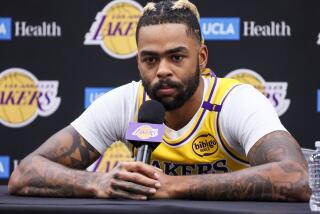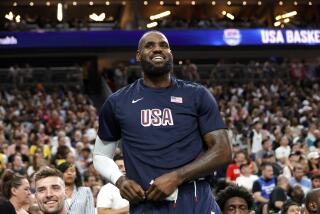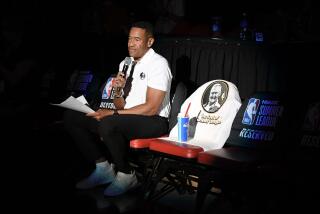DREAM WEST : Nigel Miguel Gets Second Chance With an Assist From Jerry West
- Share via
A warm summer breeze wafts across the Loyola Marymount campus. Gone in June is the tension present during the semester. Students in shorts and tank tops dribble a basketball across the parking lot, toss a Frisbee or talk of heading to the beach.
In the Albert Gersten Pavilion, home of the Loyola basketball team, the floor is filled with running, laughing kids, enjoying a day in the Paul Westhead basketball camp.
Across the walkway, however, in the auxiliary gym, there is no laughter, no talk of heading for the beach. The young men on this floor have a bigger destination in mind.
Welcome to the Los Angeles Laker rookie camp, where the tension is in late-season form. One missed pass, one blown shot, and perhaps the dream of a lifetime will be shattered.
For some of those participating--like Billy Thompson out of Louisville and Ron Kellogg from Kansas, both of whom were recently obtained in a trade with Atlanta--the tension is lessened by the knowledge that the Lakers thought highly enough of them to give up veteran guard Mike McGee along with top draft pick Ken Barlow. Thompson and Kellogg will be around, at least for training camp.
For others, like free agents John Garris and Clinton Wheeler, it’s impress now or forget it.
As the day’s first session ends, one man stays out on the court, firing 17-, 18-, 19-foot jumpers while public relations director Josh Rosenfeld shags balls for him.
The man fires from the top of the key. Swish . From the left of the key. Swish . From the left corner. Swish . Three in a row go in, then a fourth, a fifth, a sixth. And still he shoots.
Nigel Miguel cannot afford to miss. He missed his chance to impress professional scouts when he struggled through his first years at UCLA and earned a reputation as a poor offensive player. He missed his first chance to make it to the pros when he failed to last through the New Jersey Nets’ training camp. He had been drafted in the third round last year.
Now he has been invited to rookie camp by the Lakers and he doesn’t plan on missing again.
“I’m trying to keep everything in perspective,” says Miguel after finally ending his workout, “but you have to dream. It makes you work hard. If you don’t have a dream, it’s all for nothing.”
Several years ago, it appeared that Miguel’s dreams had turned into a nightmare. Moved back and forth between small forward and big guard in his junior year at UCLA, not to mention the depressingly frequent times he was moved back to the bench, the 6-6, 190-pound athlete was reduced to a non-threat offensively. His scoring average was a miserable 4.0, his field-goal percentage was 39.8. Not only had he lost his jumper, but his confidence as well.
Enter Walt Hazzard to replace Larry Farmer as head coach.
Enter Nigel Miguel into the spotlight.
Hazzard gave Miguel a slap on the back, handed him the basketball, told him he was the Bruins’ new point guard and turned him loose.
The result? Miguel’s scoring average tripled, to 12.0, his shooting percentage rose to 48.6 and his defensive skills, never in question, improved to the point that he was named Pacific 10 Defensive Player of the Year. UCLA won the National Invitation Tournament that year, with Miguel averaging 15.6 points in the postseason. His field-goal percentage was 56.3.
That was more like the Miguel the people of Pacoima remembered from his boyhood days there. He later was named All-Southern Section at Notre Dame High in Sherman Oaks.
But the real boost in Miguel’s confidence came soon after his collegiate career had ended. It came in the form of a phone call from an interested bystander who offered to work with Miguel on his offensive skills. Miguel jumped at the chance. After all, he figured, the caller knew something about the subject. His name was Jerry West.
So, last spring, after his Lakers had just won a world championship, West, the team’s general manager, took time out from his busy schedule to shoot jumpers and hand out pointers to Miguel in the empty Forum.
For a kid born in the South American country of Belize, but raised in Los Angeles since age 5, it was a barely believable scenario.
“It was a shock,” Miguel says. “I was honored, but I had to pinch myself. Here I was working with Jerry West. If he didn’t feel I was worthwhile, he wouldn’t have been out there. He told me, ‘If you don’t have any confidence in yourself, how can you expect anyone else to have any?’ This was someone I considered a legend. The team had just won a championship and he was out there working with me. Geez, it was unreal. It was like something out of a storybook. It seemed like it had to come to an end.”
It did, all too quickly.
West told Miguel that if he was still available when the Lakers’ second pick came up, which would be on the fourth round of the 1985 draft, they would select him. So when he went on the third round to New Jersey, his feelings were mixed.
Especially after he was cut.
“I was told by their coach, Dave Wohl, that they couldn’t afford the luxury of having a young player who had to be groomed,” Miguel says.
Instead, Miguel went off to the LaCrosse (Wis.) Catbirds of the Continental Basketball Assn., where he was the club’s No. 2 scorer in both the regular season (17.5 points per game) and the playoffs (21.3). He performed in the playoffs despite a torn thigh muscle.
“His defense is still the strength of his game,” West says. “He’s also very versatile, which we like. It looks like he has made improvement in his offensive skills. The area he still needs improvement in is his judgment on the break, how he handles the ball.”
Says Laker Coach Pat Riley: “He’s a great athlete. He has good one-on-one skills. He can beat his man down, function in traffic, or hit the 17- or 18-foot jumper off the dribble. But can he hit it with a defender in his face? He’s not a lead guard. What he has to demonstrate is the ability to react to situations. Somewhere in the 94 feet on the court, every player is called upon to react spontaneously, to take a situation that is not favorable and get something good out of it.”
For now, Miguel is trying to make something out of the situation at hand. If he survives rookie camp, he will be asked to join other Laker prospects in a summer league. From there, he could be asked to training camp. From there? Who knows.
“The biggest change in my game is in my head,” Miguel says. “There were few mechanical problems. The lack of confidence destroyed my game. I expected to miss. Now when I miss, it’s like, wow!
“The feeling by the pros was that I couldn’t score from the back court. I come out here every day knowing I have to prove them wrong. I’m going to make the best of the situation. I can’t go backwards. A lot of guys don’t even get a shot.”
Miguel can’t get enough shots at Loyola Marymount. No trips to the beach for him this summer. He figures if he keeps pumping in those jumpers, his day in the sun just might come this fall.
More to Read
All things Lakers, all the time.
Get all the Lakers news you need in Dan Woike's weekly newsletter.
You may occasionally receive promotional content from the Los Angeles Times.







